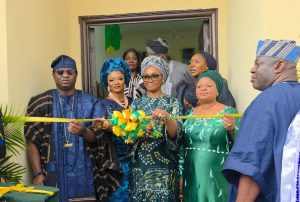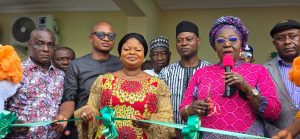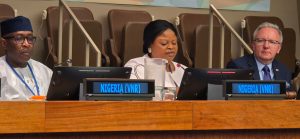At the exit of the Millennium Development Goals (MDGs) in September 2015, the world leaders came together at the 70th session of the United Nations General Assembly (UNGAS) in New York to sign a new global partnership for development tagged – SDGs. It consists of 17 goals and 169 targets to be achieved by the year 2030.
The Nigerian President, Muhammad Buhari was part of the team of leaders that endorsed the take off of the new plans; he affirmed support for SDGs to succeed especially in Nigeria, which is in tandem with the positive change mantra of his administration.
It is in the bid to succeed in this global assignment that President Buhari in his wisdom, appointed a seasoned administrator, dogged politician, a woman with record of successes and the capability to drive the team to succeed. A former Deputy Governor of Lagos State, Princes Adejoke Orelope-Adefulire, as the Senior Special Assistant to the President on Sustainable Development Goals.
Two weeks into her appointment, OSSAP-SDGs in collaboration with Department for International Development (DFID) organized a retreat in Abuja which was intended at planning and strategizing, looking at what made MDGs to succeed and the challenges it incurred with a view to come up with implementation framework for successful implementation of SDGs.
Therefore, the implementation of MDGs in Africa and Nigeria in particular remains an unfinished business which needs to be taken forward with the implementation of the Sustainable Development Goals.
The 17 goals to be implemented basically is to ensure; zero hunger, good health and well-being, quality education, gender equality , clean water and sanitation, affordable and clean energy, decent work and economic growth, industry innovation and infrastructure, reduction of inequalities, urgent action to combat climate change and its impacts, promoting peaceful and inclusive societies for Sustainable Development amongst others. These goals capture the essence of development in any nation and have as its slogan to “Leave no one behind”.
Amongst the vision of the goals is to improve standard of living and protect the planet for future generations as well to realize the future we want. While in Nigeria the prospect of achieving SDGs is expected to be pursued in an inclusive and people centered manner, thereby focus on institutional and policy strengthening supportive of the programme and projects.
The Nigeria road map to the SDGs is however designed to focus on six thematic areas namely: policies, data management, institutions, partnership, communications and finance. The implementation programme is designed to be carried out in 3 phases and according to the specific needs of each zone of the country.
- Phase 1: 2016 – 2020
- Phase 2: 2020 – 2026
- Phase 3: 2026 – 2030
If Nigeria is to succeed in this task ahead therefore, the need for all hands to be on deck cannot be over emphasized. The Federal, States, Local Governments, Civil Societies, Academia, Religious and Political leaders, media and all relevant stakeholders must work hard to bring about the sustainable development that we all look forward to by the year 2030.
The OSSAP-SDGs headed by Princes Adefulire, the management and other staff appeared to have hit the ground running , working assiduously to see to the implementation and success of the 17 SDGs for the benefit of Nigerians. Given all the necessary cooperation, it is hope that SDGs programme and projects will improve/increase developmental activities in its entire ramification and guarantee society where peace, justice and strong institution are built at all levels that we may have a world of our dreams.





2 Responses
This is a very good program we the of Nigeria in general we are supporting this great program and we will continue praying for God these programs to be completely achieved and memorable one
More greece to our president elbow ; in peace not in pieces